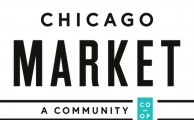 Chicago Market is a food cooperative project that just launched its first major public ownership/fundraiser campaign on Sunday. And no one can say that the co-op supermarket, proposed for the city’s North Side, is trying to elbow its way into an overcrowded commercial sector.
Chicago Market is a food cooperative project that just launched its first major public ownership/fundraiser campaign on Sunday. And no one can say that the co-op supermarket, proposed for the city’s North Side, is trying to elbow its way into an overcrowded commercial sector.
Consumers’ demand for healthful and sustainably produced food is on the rise, and it is currently being addressed in Chicago by corporate grocery chains such as Whole Foods Market. Yet, at this moment, there is only one operating food co-op in the city: Dill Pickle, located in the Logan Square neighborhood in the middle of the city.
Gregory Berlowitz — who gave up his career as an environmental lawyer to launch the Chicago Market initiative a bit more than a year ago — gives a hat-tip to Dill Pickle, calling it “terrific.” But he notes it is not convenient to his home eight miles away in the Rogers Park neighborhood on the city’s far North Side.
In between are some of the city’s most well-to-do communities, with many thousands of residents who subscribe, in at least some fashion, to the Good Food movement. Berlowitz is confident many of them would be attracted to a nearby cooperative, and the more personal, interactive approach it would provide.
“It will be owned by the community, by the hopefully thousands of members,” said Berlowitz, who cited the advantages of buying shares in the business. “You own the co-op, literally. You decide what goes on the shelves. You can run for the board and manage the co-op, or be the general manager.”
Consumers will not have to be members to shop at Chicago Market, following the practice of most of today’s food co-ops across the nation. But there will be members-only discounts and other benefits.
Berlowitz first became familiar with the food co-op concept while an undergraduate at Massachusetts’ Hampshire College, and he became an active participant during his post-graduate studies in law at University of Illinois, when he worked at the Common Ground store in Urbana.
He later was involved with two of the nation’s best-known food co-ops, Wedge in Minneapolis (home to the University of Minnesota) and Willy Street in Madison (home to the University of Wisconsin). Many of the oldest and most enduring food co-ops are located in college towns.
The current ownership drive will test whether the community at large in Chicago shares the enthusiasm of Berlowitz and his team of Chicago Market volunteers. The campaign is dubbed #1000in100 because it aims to recruit 1,000 member/owners — at $250 per household — in 100 days. There is also a higher ownership level at $500 per household.
These might seem like fairly modest amounts to obtain an ownership stake in a start-up business. But, in fact, under the century-old Illinois law governing cooperative businesses, Chicago Market cannot ask for more than that. According to Berlowitz, no individual can invest more than $500 in a single co-op.
Berlowitz said that limit, more than any other matter, is the reason why food co-ops have such a small foothold in Chicago. “In the city of Chicago, it costs a lot of money to open a store, especially if you want to open a store that is substantial. You’re prohibited from having traditional investors…,” Berlowitz said. “The law makes it difficult.”
But the Chicago Market planning team believes that it will be able to build a customer and owner base among the growing number of consumers who want to know exactly where their food comes from, are seeking value for their food dollars, and want a say in the products that are offered to them.
“The co-op hopes to be an information leader,” Berlowitz said. “This is our understanding about what food means, where it comes from, how much it costs and why it’s priced this way. We will make transparent what the co-op’s profits are, and we will turn the profits back to the co-op.”
For those in the area who want to learn more, Chicago Market is holding an open house on Sunday, June 22. The event will be held at the Metropolis Coffee Roasting Garage, 5545 N. Clark Street in the Andersonville neighborhood, from 2 p.m. to 6 p.m.
An indication of the store’s projected future lineup of local foods can be found in the list of producers who will participate in the event. They includes Seedling, a fruit grower in southwest Michigan that is prominent on the Chicago farmers market scene; Virtue, a hard cider maker with production facilities in Michigan and headquarters in Chicago; and Chicago-based Katherine Anne Confections, Jo Snow (a maker of hand-crafted syrups), and Begyle (a fast-growing craft brewery).
